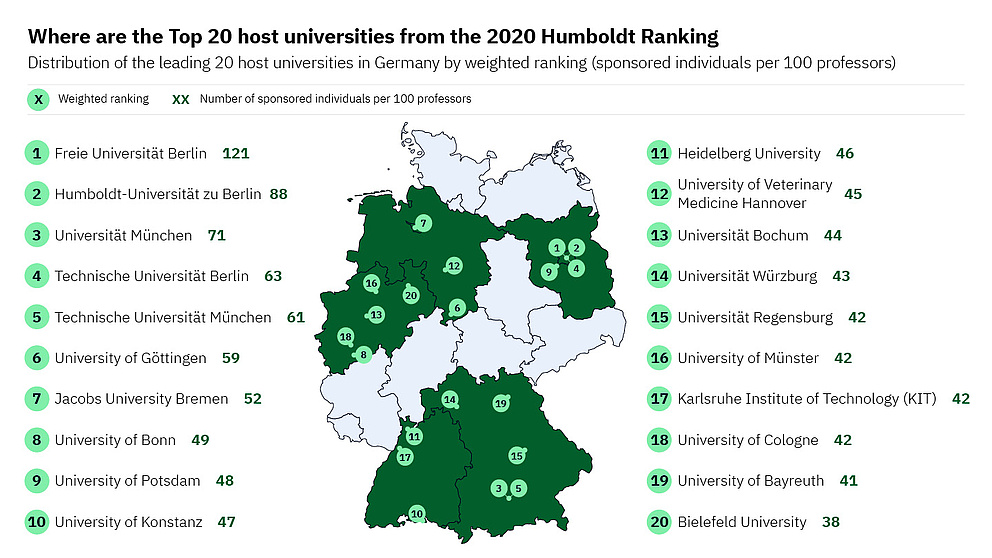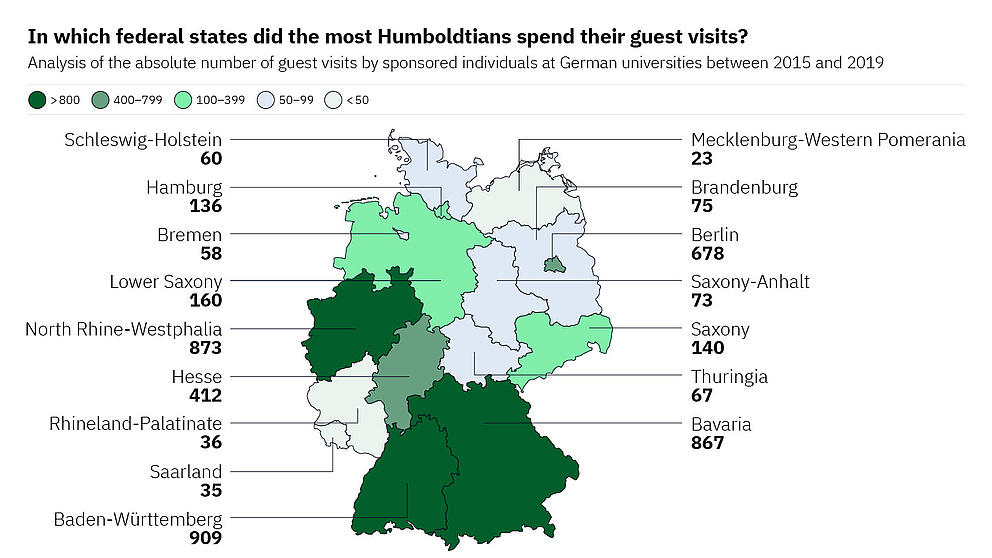updated on 8 December 2020

Kontakt
Presse, Kommunikation und Marketing
Tel.: +49 228 833-144
Fax: +49 228 833-441
presse[at]avh.de
Universities in the major conurbations Berlin and Munich are in particular demand among foreign researchers. However, universities in smaller cities such as Göttingen, Bremen and Bonn are also popular according to the new Humboldt Rankings. The ranking list shows how many researchers have come to Germany on a sponsorship from the Alexander von Humboldt Foundation in the last five years ‒ and the institutions where the greatest numbers of these researchers spent their research stays.

The top positions in the Humboldt Rankings are held by the Freie Universität Berlin and the Humboldt-Universität zu Berlin, followed by the Ludwig-Maximilians-Universität München (LMU) and the Technische Universität Berlin. The Technische Universität München, University of Göttingen, Jacobs University Bremen, University of Bonn, University of Potsdam and University of Konstanz claim positions five to ten. The largest moves up the ranking list since the last Humboldt Rankings in 2017 were posted by the University of Konstanz (which advanced from position 16 to 10), University of Veterinary Medicine Hannover, Foundation (from 38 to 12), the Universität Würzburg (from 22 to 14) and the Universität Regensburg (from 24 to 15).
Top 20 host universities
| Weighted ranking | Institution | Weighted (absolute) number of guest researchers 1) |
|---|---|---|
| 1 | Freie Universität Berlin | 120,72 (268) |
| 2 | Humboldt-Universität zu Berlin | 88,10 (259) |
| 3 | Universität München | 71,20 (267) |
| 4 | Technische Universität Berlin | 62,50 (150) |
| 5 | Technische Universität München | 61,01 (194) |
| 6 | University of Göttingen | 59,26 (160) |
| 7 | Jacobs University Bremen | 51,61 (16) |
| 8 | University of Bonn | 49,16 (147) |
| 9 | University of Potsdam | 47,89 (68) |
| 10 | University of Konstanz | 46,84 (74) |
| 11 | Heidelberg University | 45,85 (177) |
| 12 | University of Veterinary Medicine Hannover, Foundation | 45,00 (9) |
| 13 | Ruhr-Universität Bochum | 44,26 (108) |
| 14 | Universität Würzburg | 43,36 (98) |
| 15 | Universität Regensburg | 42,33 (80) |
| 16 | University of Münster | 42,31 (143) |
| 17 | Karlsruhe Institute of Technologie (KIT) | 42,22 (114) |
| 18 | University of Cologne | 42,07 (130) |
| 19 | University of Bayreuth | 40,65 (63) |
| 20 | Bielefeld University | 37,80 (62) |
1) Number of foreign guest researchers per 100 professors at the host university.
“The Humboldt Rankings show how very attractive Germany is as a location for conducting research and reflect German science’s many good international connections. The rankings also indicate which universities and research institutions are particularly popular among the Humboldt Foundation’s international guest researchers. In addition to large universities in major cities, Germany also has a wealth of attractive, smaller institutions with an international profile. Furthermore, the rankings mirror the areas of special focus at the individual locations as well. This well-spread excellence is one of the German science sector’s true strengths”, said Hans-Christian Pape, President of the Humboldt Foundation. “However, changes in mobility can currently be observed, not least of all due to the covid-19 pandemic which is probably changing international collaboration and knowledge structures on a lasting basis. This is producing challenges – but also opportunities – for finding new concepts for collaborating, sharing experience and information, and coming together at international level. It would be disastrous for Germany as a location for research – and for research itself – if we were to forget how to think beyond national borders”, Pape stressed.

In order to determine the Humboldt Rankings, the number of research stays by top international researchers and junior researchers who have conducted research in Germany in the last five years in connection with a fellowship or award from the Alexander von Humboldt Foundation are counted. To avoid statistical bias arising from differences in the size of the host institutions, the rankings relate the number of research stays to the number of professors at the respective university.
In addition to the overall list, rankings were also drawn up for individual disciplines. An overview can be found in the complete Humboldt-Rankings. As in the last ranking from 2017, Max Planck institutes head the list of non-university research institutions: The Fritz Haber Institute in Berlin, the Max Planck Institute for Polymer Research in Mainz and the Max-Planck-Institut für Eisenforschung in Düsseldorf hold the top three positions. The Forschungszentrum Jülich improved its standing, moving from 7th place in 2017 to 4th place in 2020.
(press release 21/2020)
Jährlich ermöglicht die Alexander von Humboldt-Stiftung über 2.000 Forscher*innen aus aller Welt einen wissenschaftlichen Aufenthalt in Deutschland. In weltweit über 140 Ländern pflegt die Stiftung ein fächerübergreifendes Netzwerk von mehr als 30.000 Humboldtianer*innen – unter ihnen 63 mit Nobelpreis.
